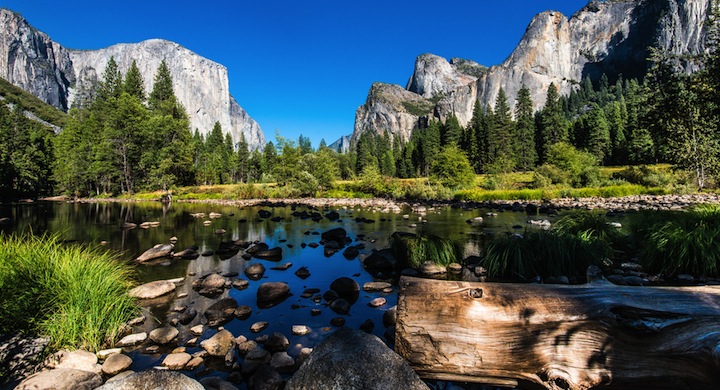Happy Anniversary America! 2016 marks 100 years of your National Park Service. Although the official date is August 16, the celebrations began in the January edition of National Geographic Magazine. There are over 400 national parks in the US that protect historical and natural treasures. Or do they? What does the whole concept of national parks tell us about our attitudes toward creation, and how can they be more biblically informed?
One way of thinking about a national park is to preserve wilderness. John Muir was famous for his passion for wild places, and wrote that “John the Baptist was not more eager to get all his fellow sinners into the Jordan than I to baptize all of mine in the beauty of God’s mountains.” He was steeped in the bible but turned much of his attention to the “book of Nature” and prefered wilderness to civilisation.
Wilderness is a slippery idea. The 1964 Wilderness Act specifies that a wilderness “is hereby recognized as an area where the earth and its community of life are untrammeled by man, where man himself is a visitor who does not remain.”
There are several problems with this definition. Firstly, there is no such thing as true anymore. We’ve so modified the climate and filled the air with pollutants, the water with plastics, modified landscapes and shot predators, modifying food chains. In his book Feral, George Monbiot showed how removing, and then returning wolves to Yellowstone National Park change the dynamic. Naive Christian views of predators from the likes of Wesley, have led to poor land management.
Secondly, it’s unlikely that there are many places that haven’t been modified by humans before the modern period, and indigenous people have been part of landscapes in the so-called “New World.” Establishing national parks often ignores the rights of first peoples. Native Americans were not consulted in the establishment of the Park. In Australia, the first people’s relationship with country was disregarded in the legal fiction of Terra Nullius. Indigenous people have always managed the landscape, and their attitude of belonging to country shows how culture and nature are not separated in their thinking. When a central American ecoreserve was mooted to protect the panther, clashes between conservationists and anthropologists and human rights activists resulted.
Thirdly, if almost four million people visit Yellowstone each year, how is it wilderness? Isn’t it more the Disneyland of nature? Are we willing to preserve vast tracts of land, for the sake of the creatures themselves? There is always tension, whether it is cattle grazing in high country in Australia, or the anti-government sentiment led by the Bundy brothers. Add to this threats of oil exploration in the Arctic (blocked for now) or dredging the Great Barrier Reef to ship more coal out of Australia, and it seems we can’t even leave alone what small areas we set aside.
Despite all of this, wilderness is important theologically. Psalm 104 establishes that God creates space for nonhuman creatures. Mountains are not simply there for us to climb or to remove for coal, but for other creatures to live in. Water is not just for agriculture, our drinking, or for Nestle to use, but for all creatures to share. Wilderness is wilderness because it is wild and contains wild creatures.
Psalm 104 extols God’s provision for lions. We’ve largely eliminated predators rather than learning to live with them as Richard Turere of the Masai community has done. From all of this, we should learn humility. Fear of God is the beginning of wisdom, and so should be fear of the wild creatures he easily controls and yet we cannot.
Further, as John Walton has pointed out, creation is a temple. God rested on the seventh day to take up ruling in his temple; see the parallels with Psalm 132. As the last of his creatures made, we are his images, placed into this temple so that we might reflect God to creation and serve him by caring for it, both for our use and its own sake. This means that humans can never be excluded from wilderness because we are meant to care for it in a priestly manner, and as image bearers, delighting in it just as God does.
Sometimes however, this priestly care will mean limiting our presence for the good of the temple. Other times, being in such places will be an important part of our spirituality and worship. Where else but away from bright city lights can we experience what the writer of Psalm 8 did, in pondering both our cosmic insignificance and yet divine calling? Where else but among our fellow creatures can we be reminded of God’s creative wisdom and power?
Getting away from our civilisation for wilderness places us in God’s hands, close to nature in all of its beauty and all of its danger – not foolishly but neither hubristically assuming we can be entirely safe. Happy Anniversary America! Go and celebrate by worshipping God outdoors, but also by being mindful of the need to continue to fight for the protection of wild spaces and the global context in which they sit – for creation’s sake and ours, and for God’s glory.
Mick has written at length of a theology of wilderness in a journal article downloadable here.

